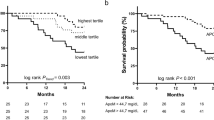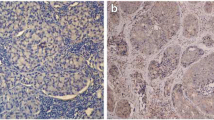Abstract
The aim of this study was to determine whether apolipoprotein A-I (ApoA-I) kinetics predict the overall survival in patients with advanced-stage non-small cell lung cancer (NSCLC) during platinum-based first-line therapy. A total of 125 NSCLC patients from January 2008 to September 2014 were retrospectively reviewed. Serum ApoA-I level was measured at baseline and thereafter at the start of each palliative chemotherapy cycle for all patients. Patients were divided into four groups according to ApoA-I kinetics. Patients whose ApoA-I ≥ 1.01 g/L and never decreased during treatment, patients whose ApoA-I ≥ 1.01 g/L and decreased (ApoA-I < 1.01 g/L) at least one time during treatment, patients whose ApoA-I < 1.01 g/L and normalized (ApoA-I ≥ 1.01) at least one time during treatment, and patients whose ApoA-I < 1.01 g/L and never normalized during treatment were assigned to non-decreased, decreased, normalized, and non-normalized ApoA-I groups, respectively. Overall survival rates were significantly different between the four groups, with 2-year survival rates of 88.6 and 17.5 % for the non-decreased and the decreased ApoA-I groups, respectively, and none survived 2 years later in the normalized and the non-normalized ApoA-I groups. When compared with the non-decreased group, the hazard ratios of death were 0.05, 0.44, and 1.73 in the normalized, decreased, and non-normalized groups, respectively (P < 0.001). Normalization of ApoA-I was associated with a low risk of progression, whereas patients with a decreased level of ApoA-I showed a progression of disease in most cases. ApoA-I can be a novel, widely available biomarker for patients with NSCLC.


Similar content being viewed by others
References
Delbaldo C, Michiels S, Rolland E, Syz N, Soria JC, Le Chevalier T, et al. Second or third additional chemotherapy drug for non-small cell lung cancer in patients with advanced disease. Cochrane Database Syst Rev. 2007;(4):CD004569. doi:10.1002/14651858.CD004569.pub3.
Molina JR, Adjei AA, Jett JR. Advances in chemotherapy of non-small cell lung cancer. Chest J. 2006;130(4):1211–9.
Camps C, Sirera R, Iranzo V, Tarón M, Rosell R. Gene expression and polymorphisms of DNA repair enzymes: cancer susceptibility and response to chemotherapy. Clin Lung Cancer. 2007;8(6):369–75.
Brower V. Biomarker studies abound for early detection of lung cancer. J Natl Cancer Inst. 2009;101(1):11–3.
Calle EE, Rodriguez C, Walker-Thurmond K, Thun MJ. Overweight, obesity, and mortality from cancer in a prospectively studied cohort of US adults. N Engl J Med. 2003;348(17):1625–38.
Michalaki V, Koutroulis G, Syrigos K, Piperi C, Kalofoutis A. Evaluation of serum lipids and high-density lipoprotein subfractions (HDL2, HDL3) in postmenopausal patients with breast cancer. Mol Cell Biochem. 2005;268(1–2):19–24.
van Duijnhoven FJ, Bueno-De-Mesquita HB, Calligaro M, Jenab M, Pischon T, Jansen EH, et al. Blood lipid and lipoprotein concentrations and colorectal cancer risk in the European Prospective Investigation into Cancer and Nutrition. Gut. 2011;60:1094–102.
Tamura T, Inagawa S, Hisakura K, Enomoto T, Ohkohchi N. Evaluation of serum high-density lipoprotein cholesterol levels as a prognostic factor in gastric cancer patients. J Gastroenterol Hepatol. 2012;27(10):1635–40.
Chi PD, Liu W, Chen H, Zhang JP, Lin Y, Zheng X, et al. High-density lipoprotein cholesterol is a favorable prognostic factor and negatively correlated with c-reactive protein level in non-small cell lung carcinoma. PLoS One. 2014;9(3):e91080.
Brewer HJ, Fairwell T, LaRue A, Ronan R, Houser A, Bronzert TJ. The amino acid sequence of human APOA-I, an apolipoprotein isolated from high density lipoproteins. Biochem Biophys Res Commun. 1978;80(3):623–30.
Yui Y, Aoyama T, Morishita H, Takahashi M, Takatsu Y, Kawai C. Serum prostacyclin stabilizing factor is identical to apolipoprotein A-I (Apo A-I). A novel function of Apo A-I. J Clin Invest. 1988;82(3):803–7.
Chang SJ, Hou MF, Tsai SM, Wu SH, Ann Hou L, Ma H, et al. The association between lipid profiles and breast cancer among Taiwanese women. Clin Chem Lab Med. 2007;45(9):1219–23.
Lane DM, Boatman KK, McConathy WJ. Serum lipids and apolipoproteins in women with breast masses. Breast Cancer Res Treat. 1995;34(2):161–9.
Ehmann M, Felix K, Hartmann D, Schnölzer M, Nees M, Vorderwülbecke S, et al. Identification of potential markers for the detection of pancreatic cancer through comparative serum protein expression profiling. Pancreas. 2007;34(2):205–14.
Zhang Z, Bast RJ, Yu Y, Li J, Sokoll LJ, Rai AJ, et al. Three biomarkers identified from serum proteomic analysis for the detection of early stage ovarian cancer. Cancer Res. 2004;64(16):5882–90.
Simpson DC, Kabyemela E, Muehlenbachs A, Ogata Y, Mutabingwa TK, Duffy PE, et al. Plasma levels of apolipoprotein A1 in malaria exposed primigravidae are associated with severe anemia. PLoS One. 2010;5(1):e8822.
Jiang R, Yang ZH, Luo DH, Guo L, Sun R, Chen QY, et al. Elevated apolipoprotein AI levels are associated with favorable prognosis in metastatic nasopharyngeal carcinoma. Med Oncol. 2014;31(8):1–9.
Charet JC, Watine J, Marre A, Charet P. Valeur pronostique des taux sériques de cholestérol et de l’apolipoprotéine A1 dans le cancer pulmonaire. Ann Biol Clin. 1997;55(1):52–60.
Xia WX, Zhang HB, Shi JL, Lu X, Wang L, Ye YF, et al. A prognostic model predicts the risk of distant metastasis and death for patients with nasopharyngeal carcinoma based on pre-treatment serum C-reactive protein and N-classification. Eur J Cancer. 2013;49(9):2152–60.
Chang CH, Hsiao CF, Yeh YM, Chang GC, Tsai YH, Chen YM, et al. Circulating interleukin-6 level is a prognostic marker for survival in advanced nonsmall cell lung cancer patients treated with chemotherapy. Int J Cancer. 2013;132(9):1977–85.
Miller AB, Hoogstraten B, Staquet M, Winkler A. Reporting results of cancer treatment. Cancer. 1981;47(1):207–14.
Ljungberg B, Grankvist K, Rasmuson T. Serum interleukin-6 in relation to acute-phase reactants and survival in patients with renal cell carcinoma. Eur J Cancer. 1997;33(11):1794–8.
Fayad L, Cabanillas F, Talpaz M, McLaughlin P, Kurzrock R. High serum interleukin-6 levels correlate with a shorter failure-free survival in indolent lymphoma. Leuk Lymphoma. 1998;30(5–6):563–71.
Liao WC, Lin JT, Wu CY, Huang SP, Lin MT, Wu ASH, et al. Serum interleukin-6 level but not genotype predicts survival after resection in stages II and III gastric carcimoma. Clin Cancer Res. 2008;14(2):428–34.
Nakashima J, Tachibana M, Horiguchi Y, Oya M, Ohigashi T, Asakura H, et al. Serum interleukin 6 as a prognostic factor in patients with prostate cancer. Clin Cancer Res. 2000;6(7):2702–6.
De Vita F, Romano C, Orditura M, Galizia G, Martinelli E, Lieto E, et al. Interleukin-6 serum level correlates with survival in advanced gastrointestinal cancer patients but is not an independent prognostic indicator. J Interferon Cytokine Res. 2001;21(1):45–52.
Salgado R, Junius S, Benoy I, Van Dam P, Vermeulen P, Van Marck E, et al. Circulating interleukin-6 predicts survival in patients with metastatic breast cancer. Int J Cancer. 2003;103(5):642–6.
Martín F, Santolaria F, Batista N, Milena A, González-Reimers E, Brito MJ, et al. Cytokine levels (IL-6 and IFN-c) acute phase response and nutritional status as prognostic factors in lung cancer. Cytokine. 1999;11(1):80–6.
Songür N, Kuru B, Kalkan F, Ozdilekcan C, Çakmak H, Hizel N. Serum interleukin-6 levels correlate with malnutrition and survival in patients with advanced non-small cell lung cancer. Tumori. 2004;90(2):196–200.
Crowl RM, Stoller TJ, Conroy RR, Stoner CR. Induction of phospholipase A2 gene expression in human hepatoma cells by mediators of the acute phase response. J Biol Chem. 1991;266(4):2647–51.
Tietge UJ, Maugeais C, Cain W, Grass D, Glick JM, de Beer F, et al. Overexpression of secretory phospholipase A(2) causes rapid catabolism and altered tissue uptake of high density lipoprotein cholesteryl ester and apolipoprotein A-I. J Biol Chem. 2000;275(14):10077–84.
Tietge UJ, Maugeais C, Lund-Katz S, Grass D, Rader DJ. Human secretory phospholipase A2 mediates decreased plasma levels of HDL cholesterol and apoA-I in response to inflammation in human apoA-I transgenic mice. Arterioscler Thromb Vasc Biol. 2002;22(7):1213–8.
Zamanian-Daryoush M, Lindner D, Wang Z, Buffa J, Klipfell E, et al. The cardioprotective protein apolipoprotein A1 promotes potent anti-tumorigenic effects. J Biol Chem. 2013;288(29):21237–52.
Acknowledgments
We would like to thank Yi-Chen Li, pharmacologist, the Affiliated Drum Tower Hospital of Nanjing University Medical College, Dan-Li Zhou, for her help with the patient registry.
Conflict of interest
The authors declare that they have no conflict of interest.
Author information
Authors and Affiliations
Corresponding author
Rights and permissions
About this article
Cite this article
Cheng, T., Dai, X., Zhou, DL. et al. Correlation of apolipoprotein A-I kinetics with survival and response to first-line platinum-based chemotherapy in advanced non-small cell lung cancer. Med Oncol 32, 407 (2015). https://doi.org/10.1007/s12032-014-0407-8
Received:
Accepted:
Published:
DOI: https://doi.org/10.1007/s12032-014-0407-8




